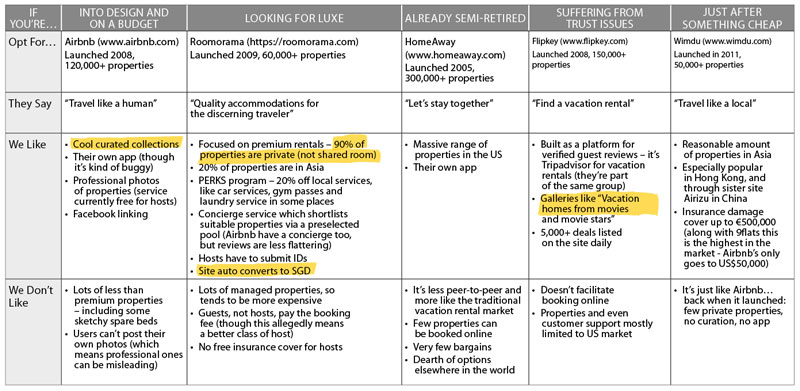Call it social travel, short-term letting, peer-to-peer holidaying or just the new, new thing, sites like Airbnb and Roomorama appear to have reached something of a tipping point; worldwide bookings through the former alone are set to exceed those at Hilton Hotels (some 600,000) this year. Renting a property instead of a hotel room when you travel abroad is nothing new; but these sites, which connect hosts with spare rooms, empty apartments, tents and even castles to guests looking for something a little different on their next trip, have revolutionized the market. Gone are the cumbersome classified ads, the exorbitant agency fees and the need to book a year in advance. Gone, too, is the hype surrounding their scuzzy progenitors, Craigslist and Couchsurfing**—both we and the Web have grown up in the last few years. Now you really can do this kind of thing not only on a whim and on a budget but in real style.
**Top of Google’s ‘related searches’ for “couchsurfing”: “couchsurfing bad experience.” Then “couchsurfing horror stories.” That’s one reason why the next gen sites have placed such a premium on identity verification.
From Door to Door
These sites, though, have themselves already been around a couple of years; so what’s new, and what difference does that make here in Singapore? Well, for one thing, there’s now a vast inventory in Asia, especially on the two sites already namechecked, meaning you can find awesome options almost anywhere you want to go. For another, many of them have big plans for the local market and, in several cases, know it pretty well already. Both industry poster boy Airbnb and the previously Euro-focused 9flats (whose VP, Wei Leen Ng, is an NUS alumni) say they’re opening offices in Singapore before year-end, to better service those of us on this side of the world. Roomorama founders Federico Folcia and Jia En Teo (also a Singaporean) are one step ahead of them, having relocated their headquarters from NYC last year to focus on operations here. Despite widely voiced concerns that Asians might not be quite so comfortable in throwing open their doors to strangers, they’re all confident this is only the beginning.
The space is evolving, too. Indeed, the notion that this is all about sketchy spare rooms has gone out the (grubby-paned) window. Roomorama, in particular, focuses on premium properties, including villas and even serviced apartments; 90% of their inventory is private and not all of it comes cheap (Teo tells us they recently had a single booking to the value of US$17,000). Airbnb, meanwhile, curate their vast collection so that instead of looking at a bunk bed, you can look at villas near vineyards, or only apartments featuring original design works by the Eames brothers (seriously—they have 53 of those). Sure, you can still find some less-than-stellar studios, but this is all a far cry from what sites like this were first known for. Indeed, those that haven’t seen fit to filter or finesse, including unabashed Airbnb clone Wimdu, look horribly out of step.
The Paradox of Choice
Where to start, though, when there are so many of these sites out there? The overwhelming number of sites can undoubtedly be a turn-off, especially when the concept of renting peer-to-peer is still new to so many. But it’s a problem that is, for the most part, disappearing; another reason why now’s such a good time to start thinking seriously about this kind of holiday, if you haven’t already.
The biggest players in the market are buying or tying up with the (reputable) competition—earlier this year Roomorama merged with European site Lofty, while Airbnb acquired the UK’s Crashpadder (the names of the two being pretty indicative of the different markets they’re going after)—meaning it’s less and less intimating when you start doing your research. There are other big players, such as the somewhat more traditional and whole lot less sexy HomeAway, which lists more than 300,000 properties, but there’s a reason we keep mentioning the other two; if you’ve an eye for design, money to spare but not to burn and an interest in offbeat and plain awesome places, then you don’t really need to look beyond them; particularly if you’re holidaying around Asia. (See Battle of the Bedrooms for a comparison of the key differences between the biggest players.)
In any case, this being the Web, there are various aggregator tools that make browsing inventory from several sites simultaneously a breeze, and curators (so 2012, darling) choosing their favorites. Late last year, Tripping launched a Kayak-style discovery engine for some 500,000+ listings on sites like Roomorama, 9flats and HomeAway; though not Airbnb. Rentmix, is a map mashup created by an ex-Google engineer that plots all the different properties for super-intuitive viewing. And the likes of WelcomeBeyond, which acts like a Mr and Mrs Smith for the rental market by handpicking properties, are a great alternative if you prefer someone else doing your gem hunting for you; though, frankly, where’s the fun in that? (They currently have only one property listed in all of SE Asia, anyway.)
Booking is getting easier, too. In April, Airbnb launched Match, a slick booking process that automates the process of messaging hosts so that guests can find the kind of property they’re looking for quicker and at the last minute; and they already have their own app. Roomorama’s ShoutOuts post messages to the whole community for faster response times, their merger with Lofty was driven in part by a desire to use their back-end to implement truly instant booking (one area the industry’s still playing catch-up with hotels) and they have an app of their own launching in the next couple of months (along with Thai and Bahasa versions of the site). User feedback—a key driver of this space from the beginning—is getting more sophisticated as the mere novelty of staying in someone else’s apartment wears off, meaning more confidence when booking. Security, specifically lack of comeback for both hosts and guests, dominated the headlines for sites like these last year, when an unlucky host had her house trashed in what became known as “the Airbnb incident”; but that triggered a wave of improvements and assurances and now 9flats, for example, trumpet their host protection plan, which runs to €900,000, as their biggest selling point and assures guests that they meet all hosts face-to-face.
Ultimately, of course, you get what you pay for—you can’t run to Reception like you can at the Ritz-Carlton, but if that’s what you expect then you’re on the wrong webpage.
5 Ways to a Pain-free Vacation Rental Experience
Long-term Lease on Life
What with all this hype and all these clones, you’d be forgiven for thinking this carries more than a whiff of Groupon about it (remember them? Check your junk folder if not). But the speed with which the market leaders have evolved (even hotels are now looking to get their suites listed) and the fact that the model is so eminently scalable (you have a room? You can make money!) suggests the travel industry’s old way of doing things really has been overturned for good.
It’s a safe bet that the space is set to grow a whole lot more, especially here, where we’re still at the surface-scratching stage. And if there are bumps ahead, they’re more likely to be regulatory than because people are bored of the concept; city councils around the world have queried the legality of tenants subletting their apartments for short-term stays, and in some cases, changed the law to prohibit it, but none of the sites has found (or necessarily tried to find) a way to police all their listings. In Singapore, the rule seems to be that you can only sublet for six months or more, though there’s some confusion about which properties that applies to.
So, while Airbnb’s revelation that hosts in NYC are now making US$21,000 a year on average might be rather envy-inducing, it’s where you can go, not how much can make, that’s truly exciting about all this. Don’t believe it? Maybe it’s time you took a look for yourself.
Battle of the Bedrooms
Not all peer-to-peer rental sites are exactly alike. While aggregators can help you navigate by location, going direct to the sites offers a greater degree of functionality. Here’s how the big players measure up, so you don’t waste your time looking in the wrong place.

See also:
Luxurious Home Rentals around Asia
Asia’s Best Villa Rental Agencies
Quirky Ideas for Budget Travel
What Readers Think About Vacation Rental Sites





